Transcription for Archives and Special Collections
More Accessible, Searchable, And Usable Collections — Crowdsource Collaborative Transcription On An Intuitive Easy-To-Use Platform
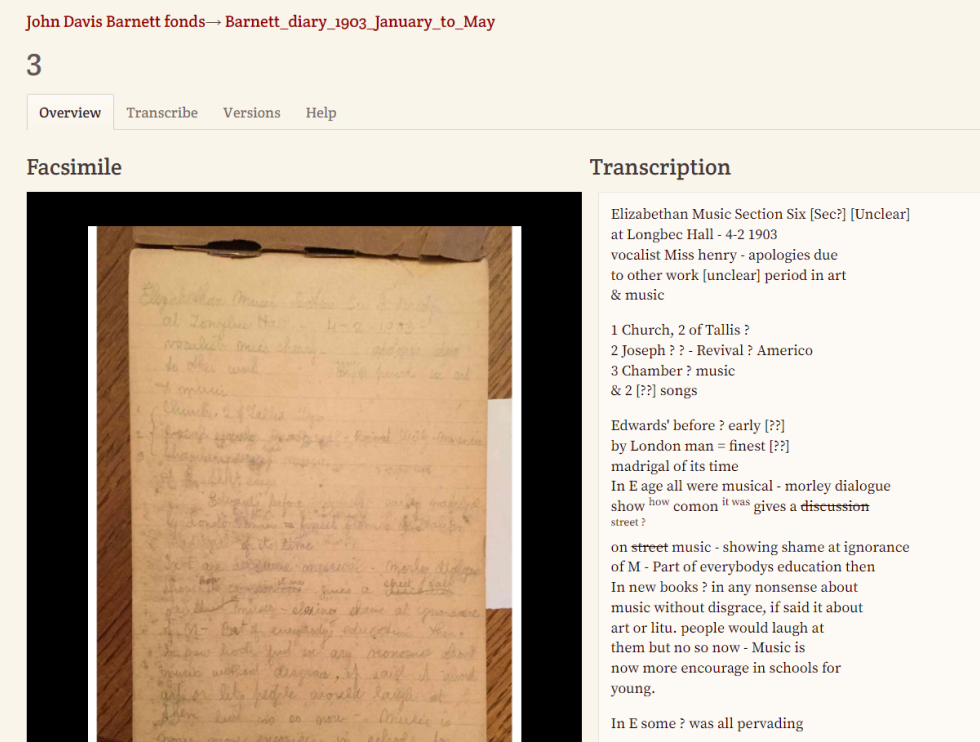
More Accessible, Searchable, And Usable Collections — Crowdsource Collaborative Transcription On An Intuitive Easy-To-Use Platform

Maximize your efforts, engage researchers, and enlist a community of volunteers with a simple, customizable tool to transcribe historic primary source materials.
Speak directly with the creators and learn how FromThePage can help you unlock the wealth of information in your digitized holdings
Free customized walkthrough of features to craft robust transcription for genealogy research, local history research, and creating ADA accessible materials
Our goals are to make primary
sources unique to Queen’s University more accessible to all, and to enhance remote
research, teaching, and coursework opportunities for our faculty and students, this
year in particular, while almost all course work is being delivered remotely. Sara
and Ben have been the most wonderful team to work with as we started up. They have
been responsive to our questions and incredibly helpful in getting us up and
running.
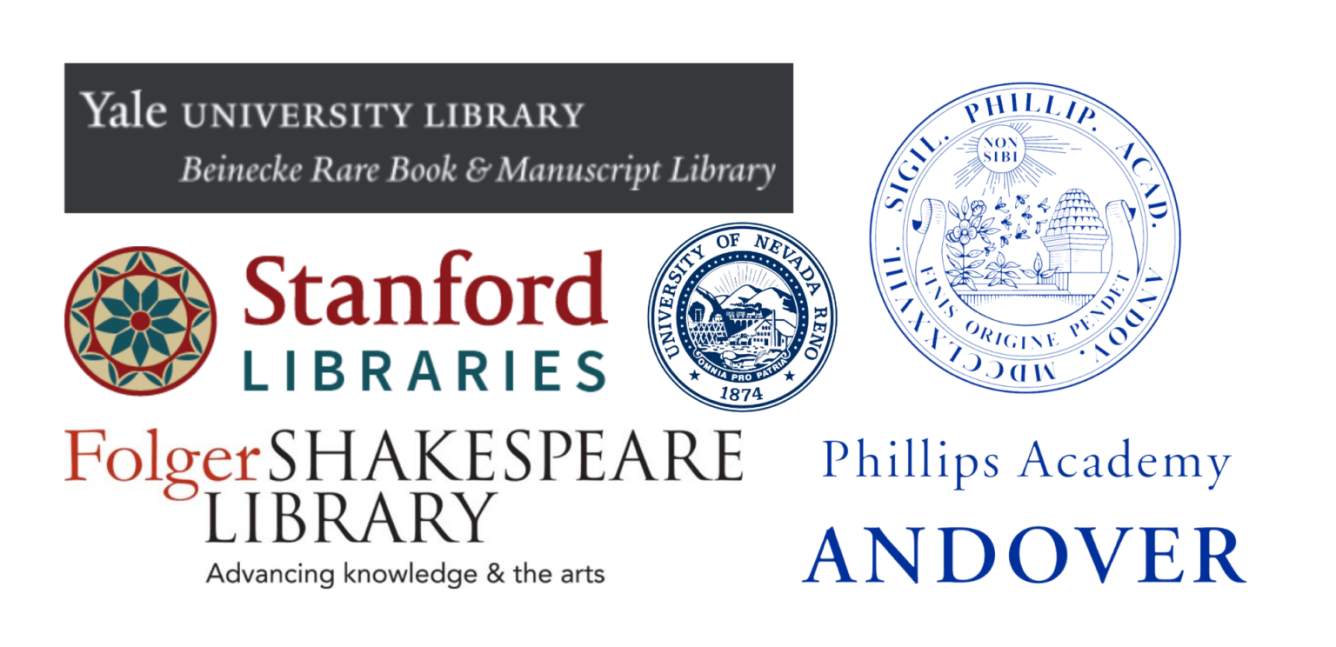
By providing accurate transcriptions, translations, and correcting OCR we are removing barriers that prevent access to digital content by people with disabilities
As part of a land grant
institution, the library wholeheartedly supports the mission of sharing knowledge
beyond the campus borders. Adhering to this mission requires a further commitment to
digital accessibility and the inclusive practice of removing barriers that prevent
interaction with, or access to, digital content by people with disabilities. By
providing accurate transcriptions, translations, and correcting OCR, we expand
access to this content for all online users in accordance with WCAG 2.1 AA
accessibility guidelines. Ben and Sara are easy to work with, understand our
profession well, and are committed to making the systems we all use easier and
better integrated.
We wanted to enrich our digitized collections, improving both the searchability and the accessibility of our records; a notoriously difficult thing for most archives to do, but here we have a way forward to address accessibility issues, and have full text available for screen readers. From an administrator's perspective, this had to be one of the easiest platforms to start up. It took all of 10-20 minutes to get our account and project started, and our transcriber managed to transcribe 20 pages before the end of the first day! Honestly, the barrier-to-entry is almost non-existent, and the rewards can be seen almost immediately. The dashboard and summary give us some great stats, and let us know who our most active volunteers are. Now, we can leverage the power of a whole world of volunteers to spend a few minutes here and there in a week to significantly improve the accessibility of our holdings.
Like many archives at the university level, we are eager for students to use archival collections in an intellectually rigorous way. Students and alumni find that crowdsourcing transcription is fun and interesting, as well as academically substantive. Having the documents transcribed enables us to ask different questions and to automate larger-scale data exploration of the primary sources. FromThePage is such a feature-rich, easy-to-use platform that using it for archival records about early Chinese students has been a worthwhile, key phase of our larger project. We have been so fortunate to have FromThePage to keep people engaged with the archives remotely during the pandemic. It is a very intuitive platform for archives and volunteers.
Whether you have an established team or are looking to crowdsource help, we provide a platform that allows you to track, control, oversee, and review projects painlessly.
Even if you’ve never crowdsourced before, we help you set everything up and provide advice on how to encourage volunteers to become transcribers for your projects.
Always get your questions answered by us directly, the developers of the software. That way you get the support and help you need faster, no extra steps.
No reason to struggle sorting through a complex set of tools that makes no sense for your primary source materials. Streamlined, intuitive tools for your specific needs can be curated to make work easier for you and collaborators.
We have experience advising many institutions how to use our wealth of tools for their specific materials, even if it’s a little out of the box. If you have a unique need, we are passionate about helping you meet it.
Skip the frustration of trying to create your own transcription process or software. We’ve anticipated the essential features you want and need; developing a superior software tool for the solution of more searchable documents.
With FromThePage you get powerful transcription, annotation, metadata, and indexing
capabilities to create searchable documents to expand the community that can access them.
Also, the user-friendly interface provides remote volunteering opportunities simply, without
overloading you or your team with time consuming tasks.
Whether you plan to
crowdsource transcription projects from your special collections and archives, or utilize an
internal team, we can advise on what features have helped our many successful clients set up
their systems for efficiency and ease of use.
Our software has been utilized by
many special collections and archives. The diverse projects we’ve supported include
transcription of institutional correspondence, WWI service cards, journals and diaries,
administrative records, financial ledgers, and community histories. We would love to walk
you through how FromThePage can help you take your rich historic holdings and make them more
accessible.
With our custom demo of the software we show you how FromThePage can be configured to
accomplish your specific goals with your actual materials. One way we do this is by sharing
case studies of other users to show how our features can support your transcription needs in
a variety of ways.
The following features are especially relevant and utilized by
librarians and archivists:
Support your programming with an online component of public engagement of transcription and translation of primary source materials.
Collaborators can zoom to decipher difficult handwriting on uploaded documents.
Page level comments and discussion create a rich experience for transcribers to become more knowledgeable and precise over-time.
Tools to oversee, track, control, and review projects so you can maintain high-quality contributions.
Field-based transcription to support pre-printed forms allows transcription of structured data from index cards, government forms, spreadsheets, and questionnaires.
Standardized metadata fields can be created so that users can create item-level metadata.
Project owners can grant access to specific people only if they wish. This can restrict access to projects to only staff members, members of a research group, or members of indigenous or descendant communities.
Review of an OCR text compared to the original source document allows for human corrected transcriptions.
Users may tag subjects like toponyms or personal names, automatically creating an index in the text, preserving variant phrases or spellings used to refer to the same subject.
Import options to load collections and associated metadata as simply as entering URLs.
In our experience, the people that are drawn to this type of volunteering are very detail oriented, passionate, curious, and committed. You can set customized guidelines, designated reviewers, and allow version history viewing to help transcribers become more precise over time.
You can upload documents in small amounts over time, the work is all defined by
your project timeline. Also, training staff or expert volunteers to be in a
reviewer role means your time doesn’t need to be monopolized by review of
transcriptions. And keeping tabs on work is easy, our nightly activity reports
show you progress in your inbox every morning.
The extensive list of
projects we’ve consulted on allows us to make suggestions to make sure your
projects will be successful and will not take excess time and effort on your
part.
We can help. The information we provide can be used to explain how this software will radically increase the usability of the resources while cultivating community engagement, allowing for the development of research initiatives, as well as enhancing collection accessibility for interoperability and supporting digital preservation.
We’ve worked in research computing for the humanities and social sciences, so we
can advise on what helps make grant applications more compelling.
The
information we can provide to reinforce your application includes similar case
studies to show how FromThePage is essential to providing readable, searchable
collections and how it’s been successfully used by many others to do just that.
We go so far as to help with Letters of Support and Budget Line item
breakdowns so including FromThePage in your grant applications is seamless.
After our custom demo call, if it doesn’t seem like a good fit, we can recommend
different approaches, other collaborators, or other platforms if they’re more
appropriate — we really don’t want you to use our software if it’s wrong for
your needs.
We do want you to be successful. We will support you
however we can in charting your path to reach your library's goals.
We can share examples of other projects that are doing similar work. This allows us to strategize with you on how best to tackle your particular materials and gives you an idea of the vast variety of projects we’ve supported.
It is our mission to make it easier, more enjoyable, and more productive to
expand your online offerings. We will help you set up your interface so you are
ready to hit the ground running, with your team or with volunteers. We can help
you with recruitment strategies and also promote the project through the
FromThePage website to our established, enthusiastic transcriber community.
The flexibility of the platform coupled with the import/export options and
the support of many different document types means integration is really simple.
If you have any questions along the way, we are available to answer
them by email or chat. We can also set up a meeting to share our screen and walk
through the platform functions with you.
You will never be left banging
your head against your desk, we promise.
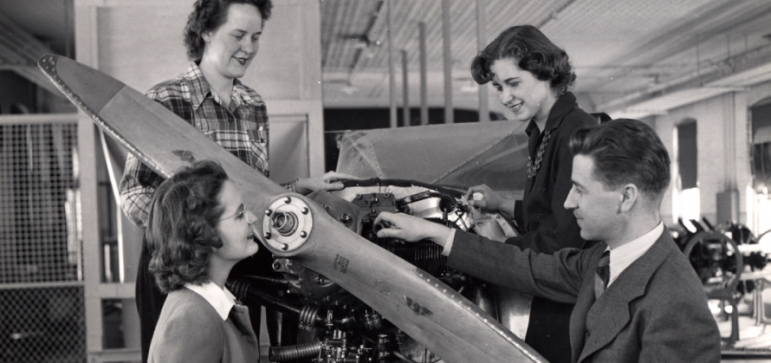
The Iowa State University Library has loaded 43 collections totaling more than 42,000 pages into FromThePage with the goal of providing accurate transcriptions to expand access to content for all online users. A variety of Special Collections & University Archives materials are worked on by crowdsourced collaborators. Six collections have been made available to the public with more released as they are fully transcribed. Check out how easy the upload process has been for them here.
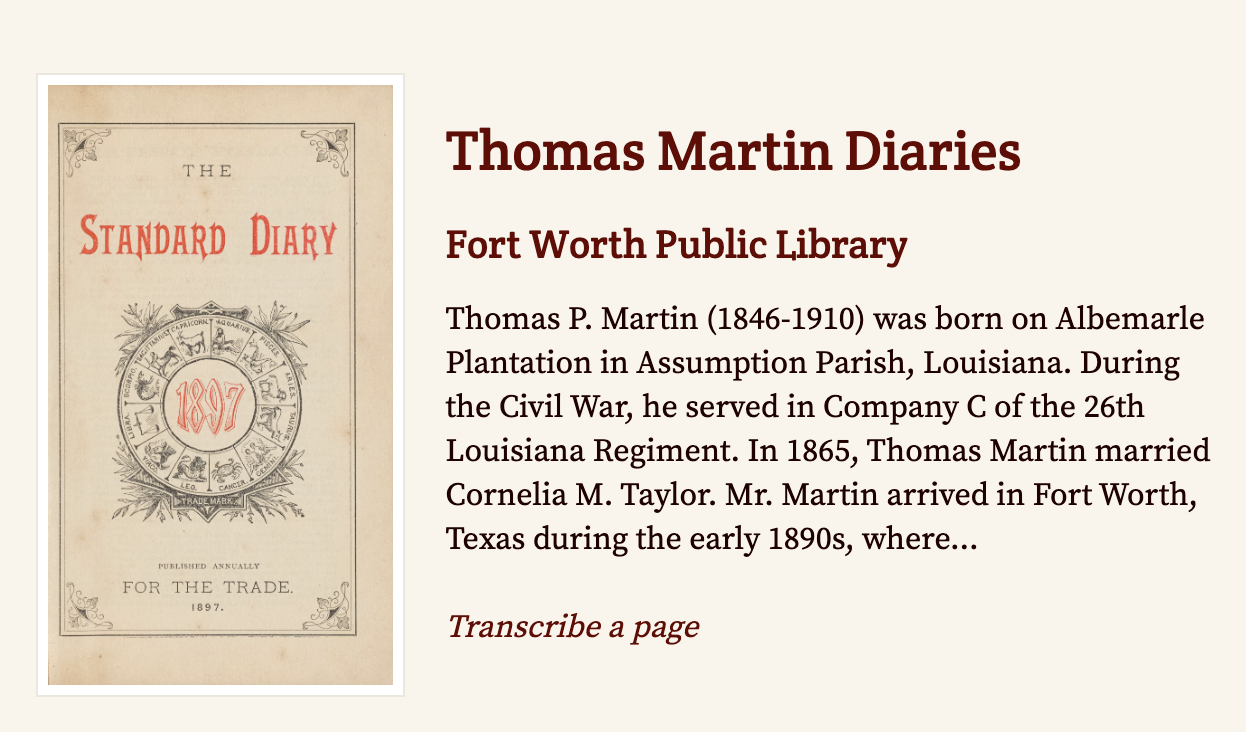
FromThePage allows the public to have meaningful interaction with the Genealogy, Local History & Archives Unit of the Fort Worth Public Library. Over 8,000 pages have been transcribed in a little over a year. Volunteers enjoy making a contribution to the historical record by transcribing hand-written or type-written documents, helping make digitized records more useful to researchers by speeding up the indexing process. Learn more about this crowdsourcing success here.
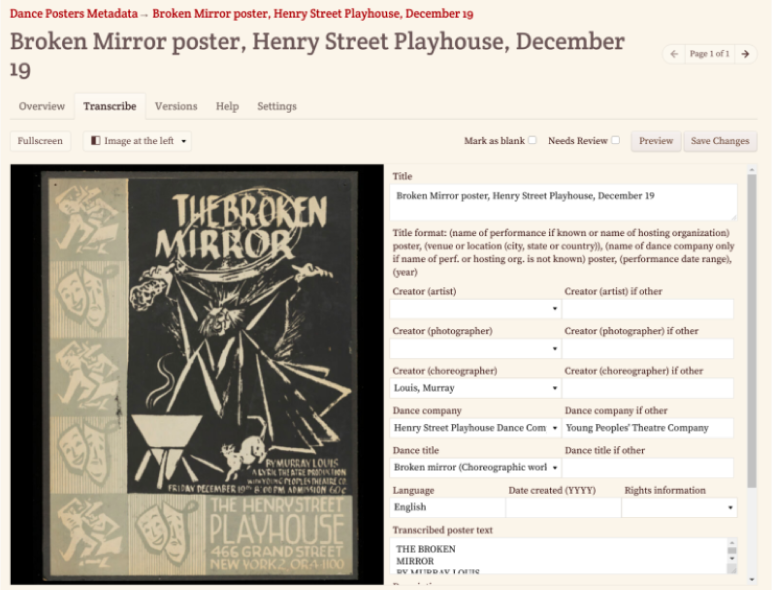
Ohio University Libraries uses FromThePage to generate transcriptions and descriptive metadata for dance posters in their collection. This project is a hybrid project, transcriptions are generated along with text from the posters captured through standardized metadata fields. This allows more accessibility and findability by users, also allowing discovery of related posters based on the standardized fields. See examples of how to capture metadata for your collection here.
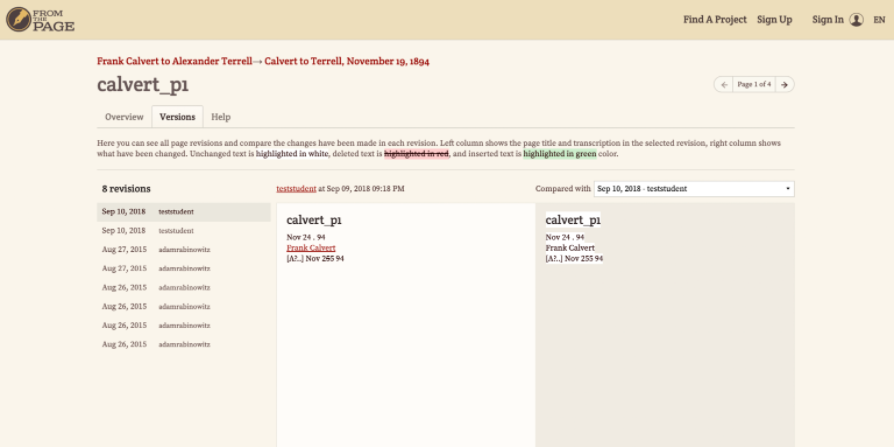
Adam Rabinowitz, a Classics Professor at the University of Texas at Austin, uses FromThePage as a teaching tool in an undergraduate course. Each student is assigned to find the primary source materials in the archive and transcribe any letter in the collection using FromThePage. Then a larger collection of transcribed letters are provided to write a paper. Read more on Adam’s use of transcription for pedagogy here.
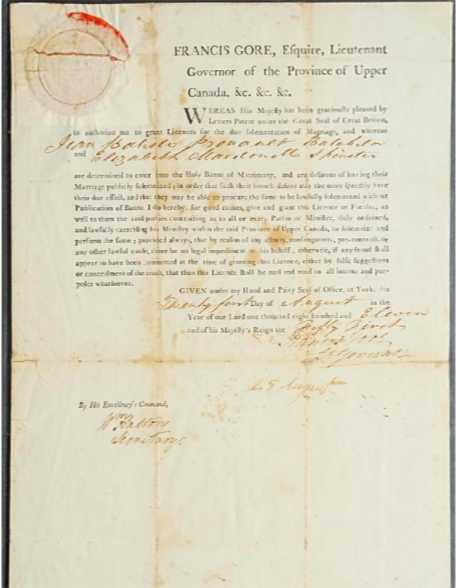
Heather Home and Jeremy Heil of Queen's University Archives use FromThePage to make primary source material more accessible, searchable, and usable. Transcription helps foster research, reveal information, and highlight materials that are often thought to be “hidden” due to the fact that their contents are not easily searchable how people have become accustomed. As they increase their digitization projects find out more about how FromThePage is providing ways to improve the discoverability of their immense holdings here.
FromThePage has proven to be a very versatile tool. It’s a great platform for collaborative work, making it easy for all users to simultaneously edit, review, and track progress within a collection. The management features also allow a lot of flexibility. Using the field-based transcription option, for example, we’ve created projects to tag works and collect metadata so our collaborators can assist with content description, in addition to transcribing. The software lends itself to creative uses by allowing administrators to configure projects and access the data in a variety of ways.
The killer feature that takes FromThePage well beyond other transcription interfaces I have seen [...] is the powerful yet simple wiki-like annotation and indexing feature. Using simple double brackets, or an optional automatic suggested markup feature, simple transcriptions immediately become “tagged” (though only for items explicit in a text, rather than arbitrary tags) in a truly powerful way, allowing visitors to find documents through a index of subjects, places, or people – or jump immediately from linked subjects within a text to others like it in what becomes a rich hypertext environment.
With all of its features, FromThePage has proven to be incredibly useful for us in cultivating community engagement, developing research initiatives, and enhancing collection accessibility. This is primarily due to the customization the platform enables. On the one hand, project contributors have the ability to reconfigure with relative ease their workspace and workflows, such as using dictation to transcribe. On the project management side, the import and export features being designed and deployed as part of the NEH-funded work with UT Libraries will greatly facilitate the movement of collections between our institutional repositories and the platform to expedite access and preserve citizen scholarship.
Pages — and counting!
FromThePage allows you to make your digitized collection content more accessible, searchable, and ultimately more usable. You can even engage volunteers in citizen scholarship while you do it!
Volunteer transcription is a great way for people to make a real difference from their home, whether they are making access to public documents easier, highlighting people forgotten by the historic records, or spotlighting a particular person or community.
Whether you transcribe internally or crowdsource with volunteers, we are here to help. If we don’t currently have the functionality you need, we will develop the solution collaboratively with you, or we will suggest alternate collaborators or platforms to help you reach your goals.
That’s what you get when you have developers that are fully invested in your success.